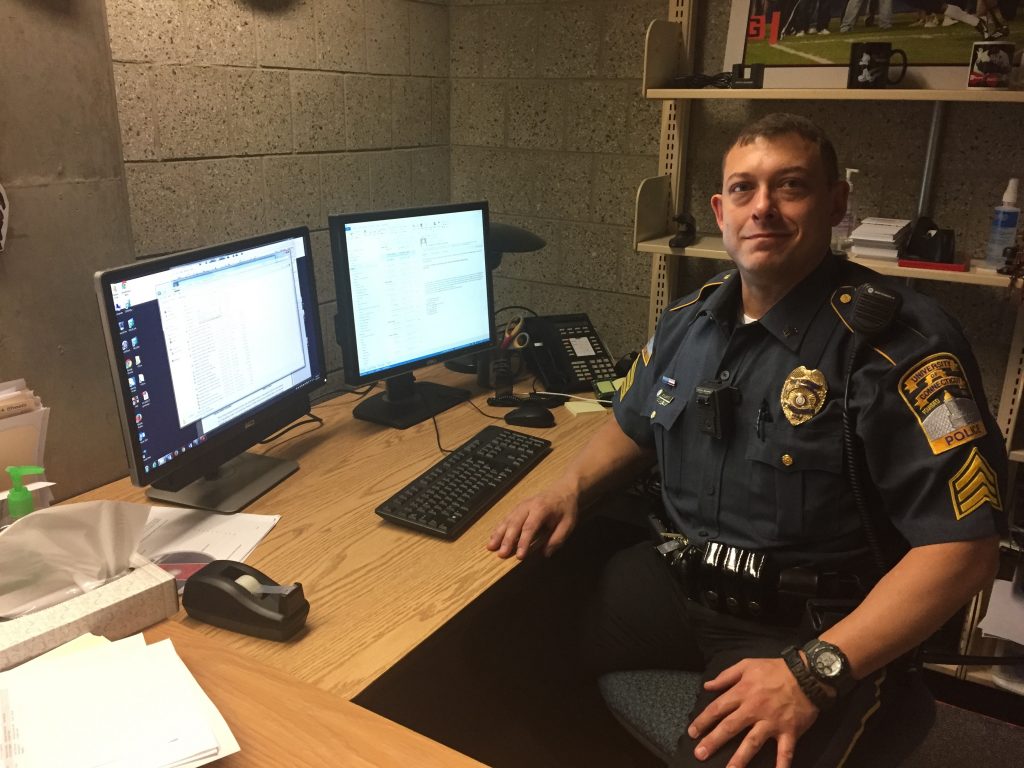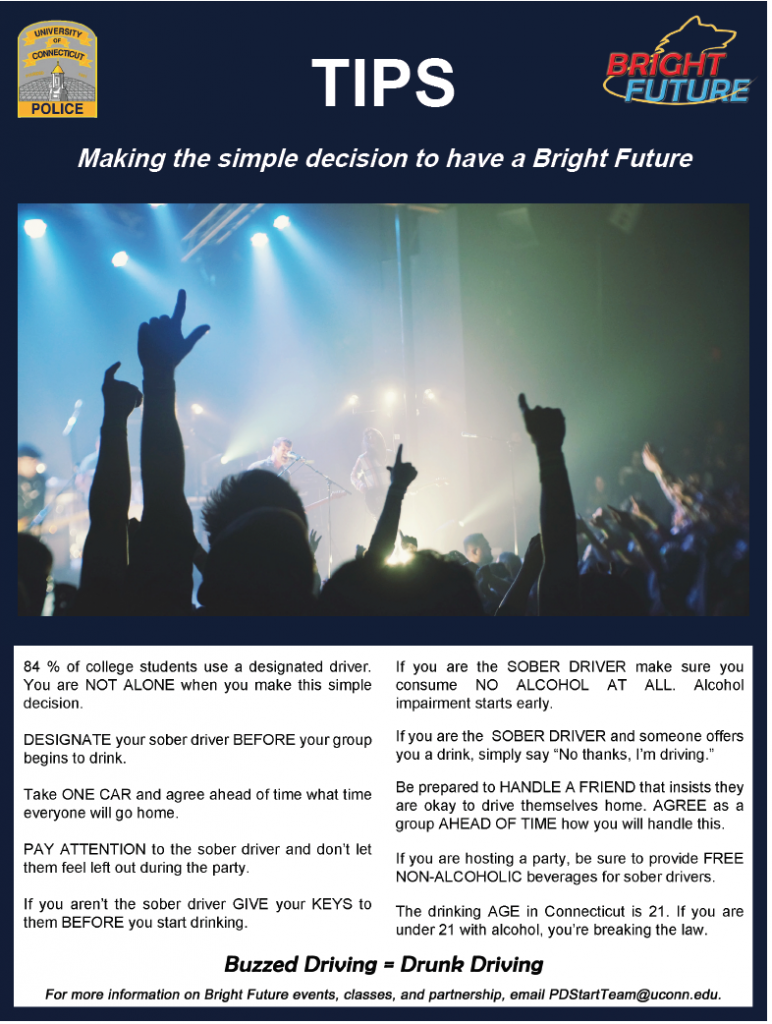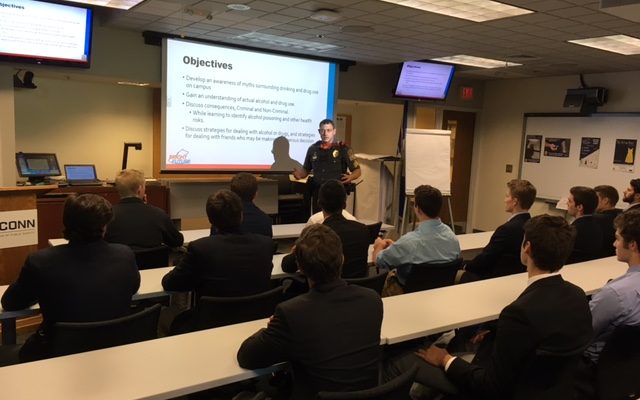STORRS – The University of Connecticut police department is promoting Bright Future, an interactive program that develops awareness about misconceptions of campus drinking and drug use, Sergeant Jason Hyland said.
Hyland said this is one of many programs of the UConn Police Community Outreach Unit’s public safety campaign to educate UConn students and Mansfield residents on pertinent issues.
“We meet with locals to address concerns about ‘irons in the fire,’” Hyland said. “We try to get out information in different ways so that it reaches different people.”
Bright Future, he said, does not tell students not to party; rather, it teaches preventative tips for alcohol or drugs.
“We focus on simple decisions,” he said. “Perceptions… effective strategies… just the decision to say ‘no.’”

UConn Police Sergeant Jason Hyland works at his desk in the Homer Babbidge Library office. | Photo: Darden Livesay
The program is activity-based, putting participants in simulations of different real-life alcohol and drug safety scenarios.
“Danger in a red cup” is an activity where a student pours fake alcohol into a cup and guesses the alcohol content. A police officer then pours the “alcohol” into the number of shot glasses that reflect the actual amount of alcohol that the student poured.
This shows students that the amount of liquid in a cup does not always accurately indicate how much alcohol they are actually drinking, Hyland said.
Another station of the program is the DUI simulator: a three-lap race in the go-kart-style racing video game, Mario Kart. Each participant does one lap unimpaired and then must finish the last two while wearing “drunk goggles” and trying to answer simple questions.
Participants have to say “crash” every time they crash during the race. Hyland said that scores dropped and crashes increased drastically after students put on the goggles, which simulate being drunk.
“It’s about about getting the brain to multitask,” he said.
He said the multitasking simulates the way in which alcohol disrupts mental processes while driving.
Although the program engages students in various game-like activities, one purpose remains clear.
“We want it not only to be fun, but to be impactful,” Hyland said. “The last thing we want to do is waste time.”
During the last activity, an officer selects students to read a DUI story to a peer as if the peer were in the accident. Afterward, the real-life victim to whom the story belongs is revealed.
“It’s a sobering experience,” Hyland said. “The victim’s face is right there, front and center.”
The police evaluate the Bright Future program based on the surveys participants fill out at the start and finish.
Hyland said that, on the survey, 96% of students responded that “drunk” driving was highly dangerous. When the word changed to “buzzed” driving, however, that number decreased “significantly.”
“‘Buzzed’ is such a nebulous word. It’s different for every person,” he said. “We have to switch the message a little bit to make students also realize the danger of buzzed driving.”

Bright Future campaign poster with quick tips to prevent drunk driving. | Photo: Sergeant Jason Hyland
To insure they used the right approach for Bright Future, UConn Police received help last winter and spring from a student intern, Kathryn Overturf.
A psychology major and criminal justice minor, Overturf did background research on universities known for successful practices in alcohol and drug awareness.
Finding original ideas was sometimes a challenge, she said. She worked around it, but there was another factor that slightly limited her capability.
“While you’re researching, you look at ideas from other universities,” she said. “They could’ve been very good ideas, but money is always an issue.”
Overturf is no stranger to the police department, as her father has been in environmental law enforcement for 30 years.
Overturf once had aspirations of following her father’s footsteps, but then she changed her mind.
“I grew up around it [law enforcement],” she said. “I wanted to be involved in the field, but just as a civilian.”
Since graduating in May, she has followed that desire and works part-time with the UConn Police Support Services. Her role includes coordinating programs and making sure the police are following certain operational standards.
Hyland said that having Overturf involved was a key part of the program’s creation.
“Peer-driven education is pretty powerful,” he said. “It [Bright Future] is developed, in part, by the people it’s going to serve.”
UConn Kappa Sigma executive committee member, Grant Cucchissi, witnessed Bright Future serving the 17 members of the fraternity’s fall pledge class.
“I do think it had an impact on them,” he said. “The point of the presentation wasn’t just that drinking is bad; it was more real life.”
Cucchissi, a junior criminology major and a member of the U.S. Marine Corps Reserve, said the pledge class’s participation in Bright Future was very relevant.
“Drug and alcohol abuse has hit very close to home for some members,” he said.
Cucchissi said that the pledge members also benefited from a Q&A session with the police in the end.
“It’s a change of pace for 18- and 19-year-old guys to be talking man-to-man to a [police officer] as opposed to when they are pulled over,” he said. “Even if some guys don’t pay as much attention to the drug and alcohol part, they could benefit from asking questions.”

UConn’s Kappa Sigma fall 2016 pledge class participated in the UConn police’s Bright Future program. | Photo: Grant Cucchissi
Hyland said the UConn Police Department knows its approach.
“It’s an evolving process,” he said. “We’re making sure that we’re actually resonating with people.”
The UConn Police, he said, hope to make people understand that law enforcement is no longer solely responsible for safety; individuals must also contribute.
He said the message is different for everyone, but the potential consequences of DUI do not change.
“I don’t think anyone has a spare $5,000 floating around to flush down the toilet,” he said.
To those at risk of DUI, Hyland suggested a simple solution.
“Share the burden. One of you is staying sober and is going to take care of everybody,” he said. “Today, it’s you. Tomorrow, it’s me.”
For more information: www.publicsafety.uconn.edu/police
Contact: Community Outreach Unit/START Program PDStartTeam@uconn.edu & 860-486-2375


